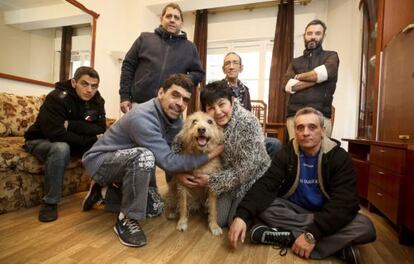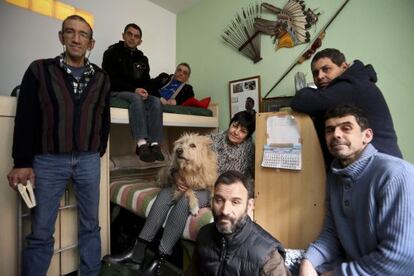“I’m the mother of anybody who comes through that door”
Gloria Iglesias has spent 15 years giving drug addicts and alcoholics a fresh start


Gloria Iglesias calculates that she has had 180 children. Not literally, but she says she shed tears for the 10 who have died over the years as though they were her own. What’s more, she’s given her charges the same opportunities any mother would give her own offspring. In some cases she gave even more, because when each of these 180 men – the majority of them drug addicts – came into her life, most had already burned all bridges with their own families. “These are my folks,” explains the diminutive 60-year-old – who used to work for Spain’s flagship airline Iberia – from the Project Gloria refuge she set up in Madrid 15 years ago. “I’m the mother of anybody who comes through that door,” she says, even including the two men who repaid her kindness by trying to kill her. The seven men now staying with her, and the many, many others who have found shelter here over the years, say they would give their lives for her.
Asked where they would be if it weren’t for Gloria, the residents all answer the same: “Dead or in prison”
Gloria had been separated from her husband for a year when she decided to set up the charity now bearing her name. Few of her friends and family understood why she made the move. “My own mother used to tell me I could have a much better life,” she says, adding that she’s lost many friends along the way who couldn’t understand why she had chosen to invite men with AIDS into her home. “I decided to do this because one day, getting off the train here in Madrid on my way back from Lourdes, I saw how many people there were sleeping rough. They weren’t children, or old people, who everybody always wants to help. These people had nobody, they were going to die alone. I set up this house so that they could have a roof over their heads and could feel some dignity again. It’s caused me a lot of suffering, but I would do it all again because I’m a believer, and I’d like to think that when I pass on to the next world, I’ll be prepared. I have learned a lot from them: about patience, tolerance, people and life.”
The 180 men Gloria has helped over the last 15 years are also a reflection of the changing face of poverty and marginalization in Spain. Initially, she took in the walking dead who inhabited Las Barranquillas, the sprawling shanty town in southeast Madrid where the capital’s illegal drugs trade is centered, one of the largest in Europe. She tried to help young men who had grown up in homes where they were uncared for and sometimes even sexually abused. But over time, she says that men from “good families” began to knock at her door: young men who had spent their first wages on designer drugs and cocaine, whose families preferred to keep their problems a secret. Gloria admits she was hurt when the family of a young man she had looked after for months after finding him alone in the street wouldn’t allow her to say goodbye before he died. “They were ashamed that the rest of the family would find out that he had been staying in a refuge,” she says. “I wasn’t allowed to see him in the hospital either, or attend the funeral.”
A former soldier who served in Afghanistan has stayed with her since he first came for help, along with a doctor from overseas who found himself on the street. “This started out as a home for drug addicts, but it has simply become somewhere for people without a roof over their head. They’re just ordinary people who lose their job, and then their home, and then their family… I currently have an engineer aged 63, Joaquín. He was sacked because of the crisis, then he was evicted from his apartment, and he had nowhere to go.”

And then there are those who recover, only for misfortune to strike again, says Gloria. One of her first residents was a young man hooked on drugs. She helped him get clean, and he got his life back on track, and left. Now, several years later, he has had to return after the small business he had worked so hard to set up failed as a result of the crisis. “He hasn’t told his family he’s back. He’s ashamed,” she says.
Joaquín and Luis are Gloria’s newest arrivals. The majority of the men here have been with her for several years, and stay on, even after they have recovered or found work. “Some of us stay because we’re just not strong enough to handle life on our own,” says Pedro, who has been with Gloria for eight years. “We feel safe here because we have to do an alcohol test each day – it’s twice a week for drugs – and because she’s here. And also because many are so ill after the life they’ve led.”
I have lost a lot of money as a result of this. I’d rather not think how much” Gloria Iglesias
Running her own charity costs Gloria around €6,000 a month, including rent on the apartment, paying her social worker, Rey, and the lease on two small premises where she keeps the furniture she collects and sells. “I have lost a lot of money as a result of this. I’d rather not think how much. The regional government of Madrid provided some funding, but the crisis put a stop to that, and people have stopped donating as well.”
Asked where they think they will be in 10 years, the majority of Gloria’s residents answer: “Here.” And asked where they would be if it weren’t for her, they also answer the same: “Dead or in prison.”
Antonio, for example, says he owes his life to Gloria. He was brought to her refuge from a municipal shelter so he wouldn’t die alone, and was given just a week to live. He had AIDS, weighed 40 kilos, and hadn’t even celebrated his 35th birthday. But Gloria was determined to help him. And Antonio, an orphan since the age of five, says that so as not to disappoint the woman who put such faith in his survival, he lived.
Gratitude seems to have been the driving force behind the recovery of so many of the men who have passed through Gloria’s doors over the years. They were so grateful, and so confused as to why this women had gotten so deep into debt on their behalf – she bought a second apartment after five friends agreed to provide bank guarantees – that they did everything they could to not disappoint her.
Antonio, who had been in and out of prison since his teenage years for stealing cars, accepted a job that Gloria arranged for him as a garage attendant. “When I went into the place the first night and saw all those keys: BMWs, Mercedes, I went running out after her, saying, ‘I can’t work in there! It’s too tempting!’ But she said that she had faith in me. She was the first person to ever say that to me.” And he continues to work in the garage and even has a fixed contract.
Again, so as not to disappoint her, Antonio, who could barely read and write, earned a high-school diploma thanks to tuition provided by friends. In three months he passed the exam.
I never had a childhood, but I have a lot of plans now. I want to do all the things I missed”
Fede, another of Gloria’s strays, was an alcoholic, but he hasn’t touched a drop in 12 years. Pi began taking heroin when he was 16, and his brother died from an overdose. “I never had a childhood, but I have a lot of plans now. I want to do all the things I missed.” Carlos left Gloria’s place after several years in December, to get married. At the ceremony, Gloria gave him away.
Most of Gloria’s former guests initially found it hard to adapt to life in the real world. She has had to venture out to places such as Las Barranquillas at 3am on more than one occasion. And over the last 15 years she has suffered from angina and other illnesses. She has also been tempted to throw in the towel more than once, but has never been able to. Her 180 children have caused her no-end of suffering, but they have also surprised her, such as the time they put her name forward for volunteer of the year, accompanying their proposal with a letter that said: “She holds us close to her heart, even though she knows we are just stones…” Needless to say, she won the award.







































